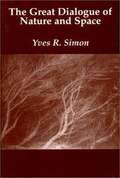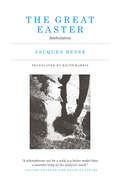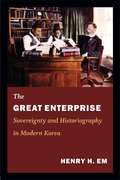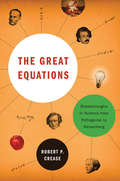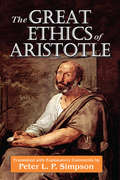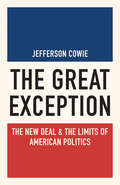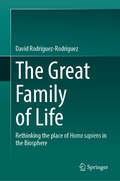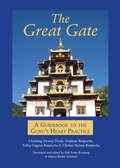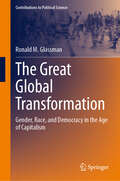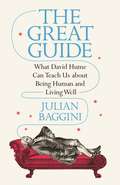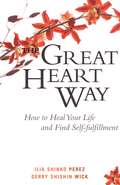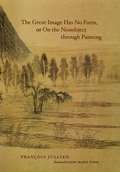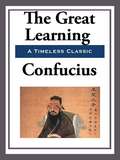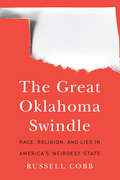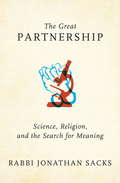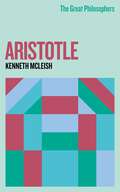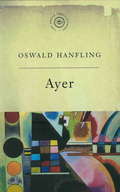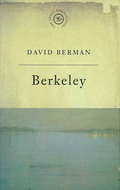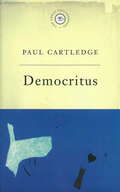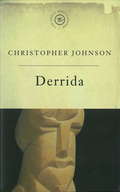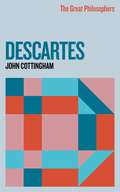- Table View
- List View
The Great Dialogue of Nature and Space
by Yves R. SimonIn this work of model clarity, Yves Simon discusses the basic insights of the creators of modern thought: Descartes, Newton, Galileo, Comte, Mach, Meyerson, Bergson, Planck, and the issues at stake in the development of modern science and in the rejection of the Aristotelian physics. Simon distinguishes between a philosophy of nature and a science of nature – and grants a real value to both. A discussion of this vexing problem and its application to the modern controversy over determinism and chance raised by modern physics rounds out this philosophical and historical highlighting of man’s most important theories of nature.
The Great Easter: Ambulation
by Jacques BesseA hallucinating, insomniac, and increasingly fragile flaneur wanders the streets of Paris over the long Easter weekend of 1960.Paris, Easter weekend 1960. The French composer Jacques Besse sets out on a marathon stroll through the city that begins on Good Friday, when he leaves his brother&’s house on rue de Turbigo, and ends on Easter Monday, when, having declared himself Mars, the god of war, to mystified restaurant-goers, he ambles back toward Saint-Germain-des-Prés. The Great Easter—a memoir in the form of a novella, or perhaps a novella in the form of a memoir—is the first-person account of a hallucinating, insomniac, and increasingly fragile flaneur&’s unending ambulation. The Great Easter was first published in French in 1969 and became famous a few years later when in their milestone work Anti-Oedipus Gilles Deleuze and Félix Guattari referred to Besse&’s walk as the quintessential &“double stroll of the schizo.&” (Besse was a patient at Guattari&’s psychiatric clinic La Borde.) Besse&’s stroll purées past and present, real and not-real: a rendezvous with a prostitute intersects with Sergei Eisenstein and his entourage, a bellowed song about the sea is overwhelmed by &“memories&” of the 1830 July Revolution, and the entire universe gathers itself up into a bubble above Gare d&’Austerlitz. He is seized by anxiety, released by joy; he announces his cosmic celebrity via a huge (imaginary) television while freezing in the night and calling out for bread. A cult favorite in France, The Great Easter is an engrossing, surreal road movie of a book.
The Great Enterprise: Sovereignty and Historiography in Modern Korea
by Em Henry H.In The Great Enterprise, Henry H. Em examines how the project of national sovereignty shaped the work of Korean historians and their representations of Korea's past. The goal of Korea attaining validity and equal standing among sovereign nations, Em shows, was foundational to modern Korean politics in that it served a pedagogical function for Japanese and Western imperialisms, as well as for Korean nationalism. Sovereignty thus functioned as police power and political power in shaping Korea's modernity, including anticolonial and postcolonial movements toward a radically democratic politics. Surveying historical works written over the course of the twentieth century, Em elucidates the influence of Christian missionaries, as well as the role that Japan's colonial policy played in determining the narrative framework for defining Korea's national past. Em goes on to analyze postcolonial works in which South Korean historians promoted national narratives appropriate for South Korea's place in the U. S. -led Cold War system. Throughout, Em highlights equal sovereignty's creative and productive potential to generate oppositional subjectivities and vital political alternatives.
The Great Equations: Breakthroughs in Science from Pythagoras to Heisenberg
by Robert P. Crease"Any reader who aspires to be scientifically literate will find this a good starting place."--Publishers Weekly While we may be familiar with some of science's greatest equations, we may not know that each and every equation emerged not in "Eureka!" moments but in years of cultural developments and scientific knowledge. With vignettes full of humor, drama, and eccentricity, philosopher and science historian Robert P. Crease shares the stories behind ten of history's greatest equations, from the "first equation," 1 + 1 = 2, which promises a rational, well-ordered world, to Heisenberg's uncertainty principle, which reveals the limitations of human knowledge. For every equation, Crease provides a brief account of who discovered it, what dissatisfactions lay behind its discovery, and what the equation says about the nature of our world.
The Great Ethics of Aristotle
by Peter L. SimpsonIn this follow up to The Eudemian Ethics of Aristotle, Peter L. P. Simpson centres his attention on the basics of Aristotelian moral doctrine as found in the Great Ethics: the definition of happiness, the nature and kind of the virtues, pleasure, and friendship. This work's authenticity is disputed, but Simpson argues that all the evidence favours it. Unlike the Nicomachean and Eudemian Ethics, Aristotle wrote the Great Ethics for a popular audience. It gives us insight less into Aristotle the theoretician than into Aristotle the pedagogue. For this reason, the Great Ethics has distinct advantages as an introduction to Aristotelian ethical thinking: it is simpler and clearer in its argumentation, matters such as the intellectual virtues are made suitably secondary to the practical focus, the moral virtues come through with a pleasing directness, and the work's syllogistic formalism gives it a transparency and accessibility that the other Ethics typically lack. Arius' Epitome, which relies heavily on this work, helps confirm its value and authenticity. Because the Great Ethics is generally neglected by scholars, less has been done to clear up its obscurities or to expose its structure. But to ignore it is to lose another and more instructive way of approaching and appreciating Aristotle's teaching. The translation is prefaced by an analytic outline of the whole, and the several sections of it are prefaced by brief summaries. The commentary supplies fuller descriptions and analyses, sorting out puzzles, removing misunderstandings, and resolving doubts of meaning and intention. This book is a fresh rendition of the work of the preeminent philosopher of all time.
The Great Exception
by Jefferson CowieThe New Deal: where does it fit in the big picture of American history? What does it mean for us today? What happened to the economic equality it once engendered? In The Great Exception, Jefferson Cowie provides new answers to these big questions. Beginning in the Great Depression and through to the 1970s, he argues, the United States built a uniquely equitable period that contrasts with the deeper historical patterns of American political practice, economic structure, and cultural outlook. During those exceptional decades, which Cowie situates in the long arc of American history, the government used its considerable resources on behalf of working Americans in ways that it had not before and has not since. The crises of the Depression and World War II forced realignments of American politics and class relations, but these changes were less a permanent triumph of the welfare state than the product of a temporary cessation of enduring tensions involving race, immigration, culture, class, and individualism. Against this backdrop, Cowie shows how any renewed American battle for collective economic rights needs to build on an understanding of how the New Deal was won--and how it ultimately succumbed to contrasting patterns ingrained in U.S. history. As positive as the era of Roosevelt was in creating a more equitable society, Cowie suggests that the New Deal may necessarily belong more to the past than the future of American politics. Anyone who wants to come to terms with the politics of inequality in U.S. history will need to read The Great Exception. Some images inside the book are unavailable due to digital copyright restrictions.
The Great Family of Life: Rethinking the place of Homo sapiens in the Biosphere
by David Rodríguez-RodríguezThis book explains the causes, consequences and desirable solutions to the unbalanced and unfair relationship between Homo sapiens and the other species that inhabit Planet Earth in a succinct, enjoyable and thought-provoking way. Major sociological, economic, political, educational, religious and phylosophical perspectives are reviewed in order to understand why we have reached the current alarming status of global biodiversity during the Anthropocene, and how we can react to it to attain not just human welfare, but global happiness. The target audience is wide, from the general public interested in the deep inner causes of environmental degradation, to college and university students and lecturers, notably in the fields of environmental ethics, environmental philosophy, environmental law and environmental politics.
The Great Gate: A Guidebook to the Guru's Heart Practice, Dispeller of All Obstacles
by Rinpoche Dudjom Kyabje Rinpoche Urgyen Tulku Dorje Dewey ChoklingVajrayana Buddhism differs from other branches of Buddhism in providing an accelerated path to enlightenment based on Dzogchen principles. The word dzogchen, translated variously as Great Perfection and Great Completeness, conveys the idea that our nature as intrinsic awareness has many qualities that make it "perfect": indestructibility, incorruptible purity, non-discriminating openness, flawless clarity, profound simplicity, all-pervading presence, and attitude of equality toward all beings. The path to connecting to these qualities was once secretly held and privately transmitted; The Great Gate: A Guidebook to the Guru's Heart Practice makes the Vajrayana path and techniques available to contemporary seekers. Drawing on the work of four renowned Tibetan masters, The Great Gate compiles concise instructions on Dzogchen's foundational practices, which comprise a powerful method for turning the mind toward the Dharma and opening to the Dzogchen perspective. This revised edition features a new translation and an extensive commentary by Chökyi Nyima Rinpoche.From the Trade Paperback edition.
The Great Global Transformation: Gender, Race, and Democracy in the Age of Capitalism (Contributions to Political Science)
by Ronald M. GlassmanThis book explores Karl Polanyi's concept of labor, land, and money as "fictional commodities" created by the market. Capitalism transformed these elements, shifting labor from artisanal crafts to factory wage work, land from communal ownership to private property, and money from a medium of exchange to capital for profit. The book extends Polanyi's vision to modern transformations, analyzing the impact of automation, Artificial Intelligence, and technological advancements on society. It examines the great changes in gender, sexuality, race, and religion, highlighting the ongoing evolution of social and cultural norms. Additionally, the book analyzes the complex relationship between free market capitalism and democracy, offering insights into the balance of power and the future of democratic governance in a rapidly changing world. This book critically analyzes the forces shaping contemporary society. It will appeal to students, scholars, and researchers in political science, economics, and the social sciences, interested in a better understanding of the great global transformation.
The Great Guide: What David Hume Can Teach Us about Being Human and Living Well
by Julian BagginiInvaluable wisdom on living a good life from one of the Enlightenment's greatest philosophersDavid Hume (1711–1776) is perhaps best known for his ideas about cause and effect and his criticisms of religion, but he is rarely thought of as a philosopher with practical wisdom to offer. Yet Hume's philosophy is grounded in an honest assessment of nature—human nature in particular. The Great Guide is an engaging and eye-opening account of how Hume's thought should serve as the basis for a complete approach to life.In this enthralling book, Julian Baggini masterfully interweaves biography with intellectual history and philosophy to give us a complete vision of Hume's guide to life. He follows Hume on his life's journey, literally walking in the great philosopher's footsteps as Baggini takes readers to the places that inspired Hume the most, from his family estate near the Scottish border to Paris, where, as an older man, he was warmly embraced by French society. Baggini shows how Hume put his philosophy into practice in a life that blended reason and passion, study and leisure, and relaxation and enjoyment.The Great Guide includes 145 Humean maxims for living well, on topics ranging from the meaning of success and the value of travel to friendship, facing death, identity, and the importance of leisure. This book shows how life is far richer with Hume as your guide.
The Great Heart Way
by Gerry Shishin Wick Ilia Shinko PerezSelf-compassion. Positive social relations. An enduring sense of freedom and peace. They're essential parts of our everyday lives, or should be. But each of us struggles with difficult emotions and mental blockages: we might lash out when we should know better, or regress in negatively familiar situations, or struggle with our confidence. These types of problematic reactions occur--and recur--when we're unkind to and negligent of our inner selves. The Great Heart Way offers us all a way to heal inner wounds and transform our difficult emotions. Anyone can try it, and everyone should. Using clear language and personal anecdotes, The Great Heart Way shows how to follow the Great Heart Method, an efficacious program for healing and self-fulfillment. The Method is easily incorporated into busy schedules (it can take less than 30 minutes per day), and is accessible to all, regardless of spiritual background. The Great Heart Way gives readers the tools to safely work through uncovered emotional pain and establish a healthier, happier and well-balanced way of thinking.
The Great Image Has No Form, or On the Non-object Through Painting
by Jane Marie Todd François JullienIn pre-modern China, elite painters used imagery not to mirror the world around them, but to evoke unfathomable experience. Considering their art alongside the philosophical traditions that inform it, The Great Image Has No Form explores the "non-object"- a notion exemplified by paintings that do not seek to represent observable surroundings. François Jullien argues that this non-objectifying approach stems from the painters' deeply held belief in a continuum of existence, in which art is not distinct from reality. Contrasting this perspective with the Western notion of art as separate from the world it represents, Jullien investigates the theoretical conditions that allow us to apprehend, isolate, and abstract objects. His comparative method lays bare the assumptions of Chinese and European thought, revitalizing the questions of what painting is, where it comes from, and what it does. Provocative and intellectually vigorous, this sweeping inquiry introduces new ways of thinking about the relationship of art to the ideas in which it is rooted.
The Great Learning
by ConfuciusThe Great Learning is the first of the Four books which were selected by Zhu Xi during the Song Dynasty as a foundational introduction to Confucianism. It was originally one chapter in Classic of Rites. The book consists of a short main text, attributed to Confucius, and nine commentaries chapters by Zeng Zi, one of Confucius' disciples. Its importance is illustrated by Zeng Zi's foreword that this is the gateway of learning. Some of the terms within the text form an important part of both classical and modern Chinese political discourse. For example, the concept of world peace has been the stated goal of Chinese statecraft from the Zhou dynasty to the Kuomintang to the Communist Party of China. Another term used in the text qin-min which Legge translates as renovating the people is the name of the People First Party, one of the minor parties in Taiwan. The Great Learning is significant because it expresses many themes of Chinese philosophy and political thinking, and has therefore been extremely influential both in classical and modern Chinese thought. Government, self cultivation and investigation of things are linked. It links together individual action in the form of self-cultivation with higher goals such as ultimate world peace as well as linking together the spiritual and the material. By defining the path of learning (tao) in governmental and social terms, the Great Learning both links the spiritual with the practical, and creates a vision of tao that is radically different than that presented by Taoism. In particular, the Great Learning sets Confucianism as being this-worldly rather than other-worldly. Instead of basing its authority on an external deity, the Great Learning bases its authority on the practices of ancient kings. The text also sets up a number of controversies that have underlain Chinese philosophy and political thinking. For example, one major controversy has been to define exactly the investigation of things. What things are to be investigated and how has been one of the crucial issues of Chinese philosophy.
The Great Oklahoma Swindle: Race, Religion, and Lies in America's Weirdest State
by Russell CobbLook down as you buzz across America, and Oklahoma looks like another &“flyover state.&” A closer inspection, however, reveals one of the most tragic, fascinating, and unpredictable places in the United States. Over the span of a century, Oklahoma gave birth to movements for an African American homeland, a vibrant Socialist Party, armed rebellions of radical farmers, and an insurrection by a man called Crazy Snake. In the same era, the state saw numerous oil booms, one of which transformed the small town of Tulsa into the &“oil capital of the world.&” Add to the chaos one of the nation&’s worst episodes of racial violence, a statewide takeover by the Ku Klux Klan, and the rise of a paranoid far-right agenda by a fundamentalist preacher named Billy James Hargis and you have the recipe for America&’s most paradoxical state. Far from being a placid place in the heart of Flyover Country, Oklahoma has been a laboratory for all kinds of social, political, and artistic movements, producing a singular list of weirdos, geniuses, and villains. In The Great Oklahoma Swindle Russell Cobb tells the story of a state rich in natural resources and artistic talent, yet near the bottom in education and social welfare. Raised in Tulsa, Cobb engages Oklahomans across the boundaries of race and class to hear their troubles, anxieties, and aspirations and delves deep to understand their contradictory and often stridently independent attitudes. Interweaving memoir, social commentary, and sometimes surprising research around the themes of race, religion, and politics, Cobb presents an insightful portrait that will make you rethink everything you thought you knew about the American Heartland.
The Great Partnership
by Jonathan SacksAn impassioned, erudite, thoroughly researched, and beautifully reasoned book from one of the most admired religious thinkers of our time that argues not only that science and religion are compatible, but that they complement each other--and that the world needs both. "Atheism deserves better than the new atheists," states Rabbi Jonathan Sacks, "whose methodology consists of criticizing religion without understanding it, quoting texts without contexts, taking exceptions as the rule, confusing folk belief with reflective theology, abusing, mocking, ridiculing, caricaturing, and demonizing religious faith and holding it responsible for the great crimes against humanity. Religion has done harm; I acknowledge that. But the cure for bad religion is good religion, not no religion, just as the cure for bad science is good science, not the abandonment of science." Rabbi Sacks's counterargument is that religion and science are the two essential perspectives that allow us to see the universe in its three-dimensional depth. Science teaches us where we come from. Religion explains to us why we are here. Science is the search for explanation. Religion is the search for meaning. We need scientific explanation to understand nature. We need meaning to understand human behavior. There have been times when religion tried to dominate science. And there have been times, including our own, when it is believed that we can learn all we need to know about meaning and relationships through biochemistry, neuroscience, and evolutionary psychology. In this fascinating look at the interdependence of religion and science, Rabbi Sacks explains why both views are tragically wrong.
The Great Philosophers
by Karl JaspersOver the last half century philosophy seems to have succumbed to irresponsibility, while at the same time casting off the chains of academia. In our struggle to secure the substance of our own day amid the storm of arbitrary, fortuitous, anarchic thinking, we shall be helped if the historic substance can be made to break through the crusts of philosophical convention and if we learn to hear its message. With this book I hope to participate in this process of transformation.
The Great Philosophers, First Edition
by Radoslav A. TsanoffThe Great Philosophers, First Edition contains four parts: Part 1. The Philosophers of Classical Antiquity; Part 2. The Doctors and Saints of Medieval Christian; Philosophy; Part 3. The Earlier Modern Philosophers; Part 4. The Philosophers of the Nineteenth and Twentieth Centuries.
The Great Philosophers: Aristotle
by Kenneth McleishAristotle c. 384- c.322 BCThe ideas Aristotle outlined in his Poetics have formed the foundation for the whole history of western critical theory. No work has had more influence upon the literature of centuries - neither has any been so profoundly, so perversely misunderstood.Mystification, moralization, recruitment into the cause of this or that literary culture... with all the interpretations, Aristotle has too seldom been permitted to speak for himself. If the prescriptive rigidities of the Renaissance went entirely against the grain of his open, accepting empiricism, the psychologising mania of the moderns has been no truer a reflection of his thought.Kenneth McLeish's introduction cuts through centuries of accreted obscurity to reveal the forthright, astonishingly original book which Aristotle actually wrote. The philosopher who emerges proves more 'modern' than any of his interpreters.
The Great Philosophers: Ayer (GREAT PHILOSOPHERS)
by Oswald HanflingPart of the GREAT PHILOSOPHERS series.A.J. Ayer 1910-1989Ayer is best remembered for Language, Truth and Logic (1936), which introduced British and American readers to the logical positivism of the Vienna circle. Hanfling shows in this introduction to Ayer's work how he turned this philosophy into a form of British empiricism in the tradition of Hume.According to Ayer, philosophy is an activity of analysts. Metaphysical truths can be neither established nor refuted by philosophical enquiry: they are meaningless. In support of this claim, he deployed his 'principle of verifiability'. But he found it difficult to refine the principle 'in such a way as to find a middle ground between [an] over-strict requirement' which would disqualify perfectly ordinary statements as meaningless, and 'the over-indulgent licensing of gibberish' - including that of metaphysics.
The Great Philosophers: Ayer (The\great Philosophers Ser. #2)
by Oswald HanflingPart of the GREAT PHILOSOPHERS series. A.J. Ayer 1910-1989 Ayer is best remembered for Language, Truth and Logic (1936), which introduced British and American readers to the logical positivism of the Vienna circle. Hanfling shows in this introduction to Ayer's work how he turned this philosophy into a form of British empiricism in the tradition of Hume. According to Ayer, philosophy is an activity of analysts. Metaphysical truths can be neither established nor refuted by philosophical enquiry: they are meaningless. In support of this claim, he deployed his 'principle of verifiability'. But he found it difficult to refine the principle 'in such a way as to find a middle ground between [an] over-strict requirement' which would disqualify perfectly ordinary statements as meaningless, and 'the over-indulgent licensing of gibberish' - including that of metaphysics.
The Great Philosophers: Berkeley (Great Philosophers Ser. #Vol. 12)
by David BermanPart of the GREAT PHILOSOPHERS series. George Berkeley 1685-1753 A scientist, theologian and writer on medicine and economics, George Berkeley was in his way a most improbable philosopher. A master of English prose, he was suspicious of language; scornful of abstractions, he looked instead to immediate experience for the basis of his thought. David Berman's readable guide traces Berkeley's experimentalism - for experiments with sight and touch to near-death experience - finding in his writings an intriguing marriage of philosophy and psychology.
The Great Philosophers: Democritus
by Paul CartledgePart of the GREAT PHILOSOPHERS series.Democritus c. 460-c. 370BCThe Renaissance's 'Laughing Philosopher'; our own age's 'Prophet of Quark': throughout the modern philosophical tradition, Democritus has been a man little known beyond his labels.Yet if the image of the cheerful ironist understates his true seriousness, that of father of modern nuclear physics - though by no means entirely unfounded - loses sign of the man in the hyperbole. Flattering as it is, it fails to do justice either to the full range of Democritus' interests or to the astonishing originality of his ideas.For Democritus' remarkable investigations took him far beyond the realms of physics and chemistry to explore the science of existence as a whole. Perception, selfhood and society; ethic, politics and the law: as Paul Cartledge's enthralling introduction makes clear, Democritus has much to teach us, in all these fields and more.
The Great Philosophers: Derrida (Great Philosophers Ser. #5)
by Christopher JohnsonPart of the GREAT PHILOSOPHERS series. Jacques Derrida 1930-2004 As critics investigate the 'death of the author', they find Derrida's prints all over the murder weapon. No other recent philosopher has aroused so much suspicion - or been so badly misrepresented. His every idea a tug at the rug beneath us, questioning our sense of ourselves, our world and the language by which both are articulated, Derrida would make uncomfortable reading under any circumstances. Add to this an at time vertiginous abstruseness and a following whose 'deconstructive' readings appear to be doing away with writing as we know it, and the hostility is understandable. Yet as Christopher Johnson shows in this eloquent, exhilarating guide, 'deconstruction' doesn't mean 'destruction' - nor does it involve any 'con'. In what may seem mere convoluted cleverness, momentous consistencies can be found; in Derrida's apparently rarefied rhetoric can be read the most radical, relevant commentary we have on the world we inhabit today.
The Great Philosophers: Descartes
by John CottinghamRené Descartes 1596-1650The 'father of modern philosophy', René Descartes has been accorded all the admiration a father customarily receives - and all the resentment.That mind-body duality by which he so deftly made sense of us now seems less paradigm than prison. And yet, to unthink it appears impossible. For better of worse, Descartes must remain our starting-point in the attempt to understand ourselves and our relation to our world.Yet if the problems begin with Descartes, so too may some of the solutions. John Cottingham's fascinating guide finds in the French philosopher's own neglected later work some intriguing hints as to how the stumbling-blocks might be surmounted. The father of modern philosophy, it seems, might yet be his child's deliverer.
The Great Philosophers: Descartes (The\great Philosophers Ser. #7)
by John CottinghamRené Descartes 1596-1650 The `father of modern philosophy?, René Descartes has been accorded all the admiration a father customarily receives ? and all the resentment. That mind-body duality by which he so deftly made sense of us now seems less paradigm than prison. And yet, to unthink it appears impossible. For better of worse, Descartes must remain our starting-point in the attempt to understand ourselves and our relation to our world. Yet if the problems begin with Descartes, so too may some of the solutions. John Cottingham?s fascinating guide finds in the French philosopher?s own neglected later work some intriguing hints as to how the stumbling-blocks might be surmounted. The father of modern philosophy, it seems, might yet be his child?s deliverer.
